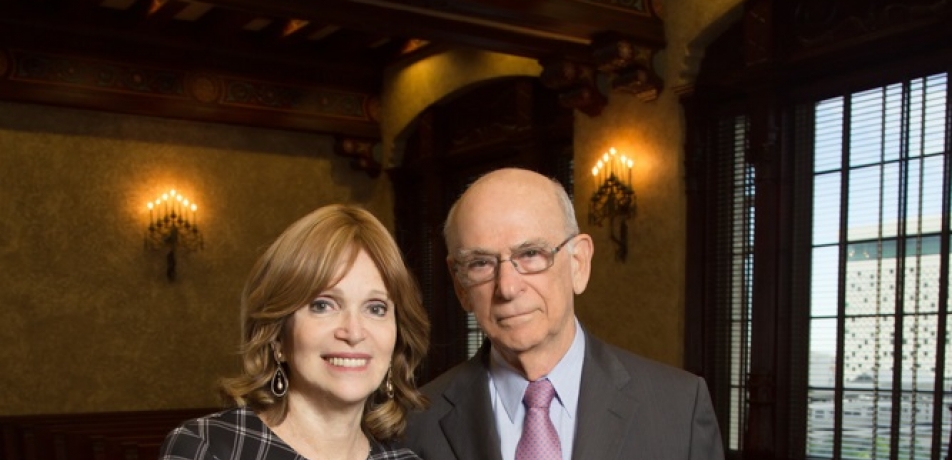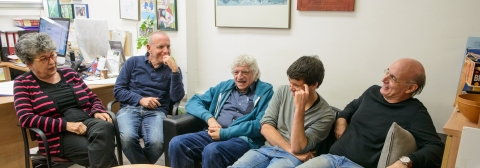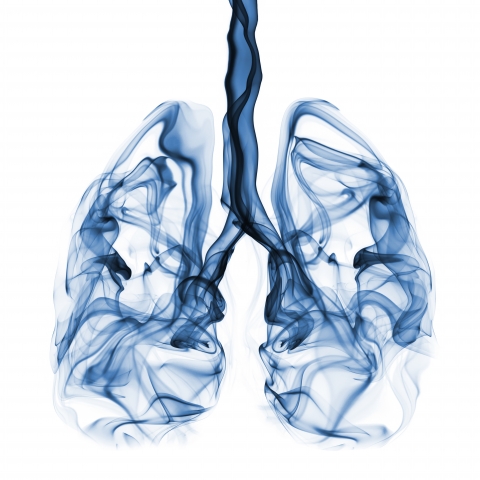Poetic justice
How two Miami lawyers beat the tobacco industry
People behind the science

Today, most everyone takes it for granted that cigarette smoking and second-hand smoke are bad for our health.
But it wasn’t so long ago that the public was in the dark - or at least behind a screen of smoke and mirrors - about the dangers of smoking.
An early battlefield in turning the tide of public opinion was litigation involving the airline industry, which became a petri dish in the public debate about the health hazards of smoking and smoke exposure. The first of the smoking bans on U.S. domestic flights was enacted in 1988; the international flight ban came a decade later. The litigation that in large part led to that legislation began with two Miami lawyers, Susan and Stanley Rosenblatt, who launched a David-and- Goliath style fight against Big Tobacco on behalf of a group of nonsmoking flight attendants.
Their landmark suit, filed in 1991, Broin v. Phillip Morris, was the first class-action suit filed against the tobacco industry and the first non-smoker’s case seeking damages for injuries from exposure to second-hand smoke. It resulted in a settlement after months of trial that included, among other benefits, the endowment of a $300 million nonprofit foundation, the Flight Attendant Medical Research Institute (FAMRI). Since its establishment in 2001, FAMRI has prudently distributed that money— handed over by R.J. Reynolds, Phillip Morris, and other tobacco giants in a 1997 settlement—in the form of grants for lung disease and cancer research at top-notch scientific institutions and by leading scientists, including significant grants to the Weizmann Institute of Science under the auspices of the FAMRI Center of Excellence at the Institute. (See related story).
“The wonderful irony is that this is money from the biggest cigarette manufacturers that is going to fund research which we hope and believe will lead to a cure for lung cancer and other lung diseases,” says Susan Rosenblatt. She and her husband represented the class of U.S. flight attendants in the Broin suit and, upon its settlement, worked with the court to establish FAMRI. Weizmann Magazine interviewed the Rosenblatts in Miami’s Dade County Courthouse where the trial took place. That courtroom was also the location of the Rosenblatts’ second case, Engle v. Reynolds, which represented smokers against the tobacco companies and resulted in the biggest punitive damage verdict in U.S. history at $145 billion. FAMRI trustee Patty Young, a former class representative and former flight attendant, joined the interview to describe her historical struggle to ban smoking in airline cabins and her personal mission to have all health care professionals ask their patients about exposure to second-hand tobacco smoke.
Seeking justice
Patty Young joined American Airlines in 1966 at age 20. She noticed that her fellow flight attendants who had never smoked were receiving diagnoses of chronic problems such as bronchitis, asthma, sinusitis, and emphysema.
“We were all required to have annual physicals, and many of us were being told by our doctors: ‘You have the lungs of a smoker,’” she recalls. “I wanted to know why, though the answer was obvious. It felt like a huge injustice. Putting an end to smoking on planes became my lifelong crusade.” For years Ms. Young has suffered from sinusitis and is recovering from a recent surgery.
Ms. Young, who lives in Dallas, traces her sense of outrage at injustice to the age of three. It was several years after the end of WWII and her father, who had been a photographer in the U.S. Army Air Corps, opened up to her mother about the atrocities he witnessed and documented in the concentration camps. His photographs were later used in the Nuremberg Trials. “He was crying, and he said to her: ‘Everyone just stood by and watched it all happen,’” she recalls.
“I was too little to understand everything, but I knew that what he was saying was terrible. At that moment, I said to myself: ‘I’m never going to be quiet if I witness an injustice. And so, years later when I began to see what was happening to flight attendants, I had found my mission.”
Ms. Young testified before Congress and lived in perpetual fear of being fired, but she persisted. In her travels, she would thumb through the Yellow Pages to find lawyers and showed up on their doorsteps, pleading with them to sue the tobacco companies on her behalf. But she could not convince a single attorney to take on the industry; at that time, smokers had never successfully sued a tobacco company and second-hand smoke was considered an annoyance, not a danger.
In the late 1980s, she learned about Stanley and Susan Rosenblatt, who had achieved renown in Florida for successfully taking on tough and controversial cases. Ms. Young was advised that if she learned of a flight attendant with a potentially serious injury, she should give her the Rosenblatts’ phone number. She did just that when she was contacted by a young nonsmoking flight attendant in 1990 who had just been diagnosed with a small lesion on her lung and had undergone surgery to remove the lesion.
The Rosenblatts ultimately agreed to accept the case, but not as an individual lawsuit. Susan had previously worked on class actions and came up with the idea of filing a national class-action suit on behalf of nonsmoking flight attendants. Patty Young and other flight attendants asked to be included as class representatives and the case was filed in 1991.“Everyone told us not to take the case - that it was a lost cause, that we’d be in way over our heads, and that we’d just throw ourselves into massive debt,” says Susan. “But Stanley was eager to take the deposition of the CEOs of the cigarette makers. We did go into great debt, and we had nine kids to raise. The trial took a heavy toll on us. But the deeper we got into it, the more single-minded we became to see it through.”
“It became an obsession and there was no turning back,” says Stanley. “What was an eye-opener to me was that a tremendous number of kids began smoking when they were as young as 11. So when the CEOs talked about choice, I sized it up as another piece of their propaganda.”
The Rosenblatts are both originally from Brooklyn, NY, and both received their law degrees at the University of Miami. In addition to the couple’s law practice in downtown Miami, Stanley hosted two PBS television series, “Within the Law,” and “Israeli Diary” for which he interviewed Israeli political figures, including prime ministers and presidents. The Rosenblatts battled the dozens of tobacco lawyers alone, Stanley doing the courtroom litigating and Susan doing research, handling all appeals and gathering evidence. Beyond being outnumbered, grappling with the reams of documents and evidence, and surviving the long hours, the essence of the trial was difficult because they also had to do battle with the body of skewed science developed since the 1950’s through the Counsel for Tobacco Research, a nonprofit foundation run by tobacco industry CEOs ostensibly to disseminate accurate scientific research findings on tobacco-related research. One of the Rosenblatts’ most important successes in the trial was their exposure of CTR for what it was, a public relations machine for the industry.
A turning point came when Stanley recruited two former U.S. Surgeons General—one of whom later became FAMRI’s mentor and chairman of the medical advisory board—who testified about the dangers of smoking and secondhand smoke.
The impact of FAMRI
The Rosenblatts and the court established FAMRI as a nonprofit in Florida and the Rosenblatts appointed a majority of flight attendants to sit on the Board of Trustees. The medical advisory board includes some of the top American physicians and scholars with expertise in lung diseases. Its founding chairman was the late Julius B. Richmond, MD, who served as U.S. Surgeon General and Secretary of Health under President Jimmy Carter. Today, its medical advisory board is chaired by Dr. David Sidranksy of the Johns Hopkins School of Medicine. Stanley is FAMRI’s chairman and Susan is a trustee, both serving without compensation.
Its board and the Rosenblatts painstakingly review the many grant applications, following an extensive peer review process by the American Institute of Biological Services. Research to date has focused on sinusitis, emphysema, chronic bronchitis, chronic obstructive pulmonary disease (COPD), asthma, heart disease, lung cancer and other cancers, stem cells, neurologic effects of smoking, reproductive and pregnancy effects, and more.
“We are very hands-on,” says Susan. “One of the areas that excites us most is the promise of stem cells, which is why we’re supporting that research at Weizmann [of Prof. Yair Reisner].” The Weizmann Institute research, headed by Prof. Varda Rotter, “is very impressive,” adds Stanley.
Since its inception, FAMRI has funded extensive research throughout the world, including through its five centers of excellence. In addition to the Weizmann Institute (the only non-American institution), the others are Hopkins, the American Academy of Pediatrics, the University of California at San Francisco, and Mount Sinai Medical Center in New York. FAMRI funds health screening centers for nonsmoking flight attendants throughout much of the U.S.
In 2013, FAMRI commissioned a professional outside analysis of the impact of FAMRI-funded research. “The outcome is astonishing as it shows in an objective manner that FAMRI as an entity ranks between the top two institutions in the U.S.—Harvard and Johns Hopkins—and ranks above the leading institution on the European stage—Oxford—in overall impact of its published research,” wrote Dr. Sidransky in the most recent FAMRI summary report.
‘Help from above’
In addition to the creation of FAMRI and individual lawsuits for flight attendants that determined liability, the suit also caused a cascade of events that led to various smoking bans and created a critical tipping point for the general public’s awareness of the dangers of smoking and second-hand smoke. Shortly after filing the flight attendants’ case, the Rosenblatts filed a second class-action case in which the lead plaintiff was their children’s pediatrician, Dr. Howard Engle. Dr. Engle was a chain smoker who told the Rosenblatts that he was desperate to quit but couldn’t; he eventually died of emphysema and COPD.
The Engle trial, filed in 1994, claimed that the tobacco companies intentionally hooked smokers despite knowing about its dangers. That trial was and still is the longest trial in U.S. history, at two years (1998-2000). Its original punitive damages verdict was appealed and set aside. But two of the three compensatory damages awards were affirmed, as were key liability findings including conspiracy to commit fraud, which enabled class members to file separate lawsuits with binding liability findings—a major breakthrough in holding the tobacco companies accountable for diseases and health risks associated with smoking. The Engle trial ultimately spawned about 8,000 individual lawsuits and helped produce hundreds of millions of dollars in compensatory and punitive damage verdicts.
The Rosenblatts, who are Orthodox Jews, say their religious beliefs and commitment to justice were driving forces behind their mission. “And now, years later, I feel even more committed religiously—like we had some help from up above—because we fought and won a seemingly impossible battle,” says Susan.
“I have never had many people in my life that I looked at as heroes,” says Patty Young. “But, finally finding Stan and Susan Rosenblatt to help us and represent the U.S. flight attendants against Big Tobacco, they became true heroes to me. The day our class-action trial started on June 2, 1997, American Airlines finally became smoke-free worldwide. Our trial made this happen because of the publicity around it. What a win we enjoyed that very day alone.”

A dozen years of FAMRI-funded lung disease
research at the Weizmann Institute
Since 2003, the Flight Attendant Medical Research Institute (FAMRI) has supported the FAMRI Center of Excellence at the Weizmann Institute, one FAMRI’s five centers of excellence. The center pursues multiple avenues of lung disease research. Prof. Varda Rotter of the Department of Molecular Cell Biology heads the center, which brings together Weizmann Institute scientists with physicians at Chaim Sheba Medical Center at the Tel Hashomer Hospital. The center has generated significant results that have been published in more than 200 journal articles. The FAMRI Center of Excellence at the Weizmann Institute aims to achieve a comprehensive understanding of the molecular genetic events underlying the initiation and progression of lung diseases and lung cancer.
Prof. Rotter's team’s research addresses two main avenues: the exploration of the basis for lung pathologies including Chronic Obstructive Pulmonary Disorder (COPD) and cancer; and finding ways to cure lung pathologies.
With respect to understanding the connection between smoke, inflammation and COPD, the group of Prof. Ronen Alon of the Department of Immunology is investigating the influence of the enzyme heparanase in smoke-induced inflammation in the lung, which may establish heparanase as a risk factor and a potential therapeutic target in smokeinduced COPD.
Prof. Zvi Livneh and Dr. Tamar Paz-Elizur of the Department of Biomolecular Sciences have shown that individuals differ greatly in their ability to cope with tobacco smokeinflicted DNA damage, which they found to be a key determinant of the risk of developing lung cancer. They are also investigating whether DNA repair capacity plays a role in COPD.
The group of Prof. Gidi Rechavi, a pediatric hematologist-oncologist at Sheba, is exploring transposable genetic elements - sequences of DNA that move from one location in the genome to the other - and their contribution to human cancer. The work addresses the possibility that exposure to tobacco smoke may increase the mobility of transposable genetic elements, thereby contributing to the insertion of mutations and deregulation of genes.
Tumor heterogeneity is emerging as a key challenge in the future implementation of personalized cancer medicine. Dr. Einav Gal-Yam of Sheba together with Prof. Amos Tanay of the Department of Biological Regulation and the Department of Computer Science and Applied Mathematics are developing methods that will enable the expression profiling of many single cells derived from an individual lung tumor. They expect that this will lead to an in-depth picture of the heterogeneity of the cancer stem cell population with respect to several characteristics such as the nascent epigenetic states of single cells.
Another avenue of research focuses on cancer stem cells, which are considered “cellular milestones” in the development of cancer, and may arise from smoke induced genomic damage in stem cells. For that reason, the group of Prof. Rotter is developing methods to identify and isolate lung cancer stem cells for the detailed characterization of this important cell population and expanding these studies to human lung tumors using cancer biopsies to be obtained from the human tissue bank of Dr. Amir Onn at Sheba, a pulmonary oncologist and co-director of Sheba’s Tissue Bank.
The Livneh group is also looking at whether DNA repair mechanisms are compromised in stem cells. This is expected to lead to the development of safe ways to propagate stem cells, which could ultimately help prevent the formation of cancerous mutations in stem cells used for transplantation. They are collaborating with Dr. Jacob Hanna of the Department of Molecular Genetics and Dr. Itai Pessach of Sheba on this project.
The Hanna team, which has already greatly contributed to the development of stem cells under laboratory conditions, mostly Induced Pluripotent Stem Cells (iPSCs), is working to increase the efficiency of generating such stem cells and their adaption for human patient stem-cell based therapy. He will focus on implementing his developing technology to lung damaged patients and develop novel technological platforms and make them available to the other members to pursue their research goals. This study is done in collaboration with the Pessach group which is creating specific iPSC lines derived from pulmonary tissue obtained from patients with tobacco-associated disorders. This repository will be made available to the other collaborators in the center. In addition, they are investigating how various tobacco-associated damages affect the tumor environment.
Taking yet a different angle for developing stem-cell based therapy for damaged lungs, members of the group of Prof. Yair Reisner of the Department of Immunology are seeking ways to isolate stem cells from lung cells and using such physiological agents for lung therapy. He is working on improved methods of stem cell transplantation to heal the lungs of mice afflicted with smoke and second-hand smoke induced lung injury. This will be a prelude for a clinical trial in COPD or idiopathic pulmonary fibrosis (IPF) patients. The application of this study will be done in collaboration with the Onn group, which is providing biological bio-specimens of human lung biopsies, representing the various subtypes of lung cancer with a known smoke exposure history.
Prof. Ronen Alon is funded by Mr. and Mrs. William Glied, Canada, Herbert L. Janowsky Lung Cancer Research Fund, The Henry Chanoch Krenter Institute for Biomedical Imaging and Genomics. Prof. Alon is the incumbent of the Linda Jacobs Professorial Chair in Immune and Stem Cell Research.
Prof. Yair Reisner is funded by Friends of Michael Baker, Canada Ș Leona M. and Harry B. Helmsley Charitable Trust, Roberto and Renata Ruhman, Brazil. Prof. Reisner is the incumbent of the Henry H. Drake Professorial Chair of Immunology.
Prof. Varda Rotter is funded by Flight Attendant Medical Reseach Institute (FAMRI), Philip Garoon, Chicago, IL, Leir Charitable Foundation. Prof. Rotter is the incumbent of the Norman and Helen Asher Professorial Chair of Cancer Research.



Some of the members of the Weizmann Institute FAMRI Center of Excellence, from L to R: Center head Prof. Varda Rotter, Prof. Ronen Alon, Prof. Zvi Livneh, Prof. Amos Tanay, Prof. Gidi Rechavi
